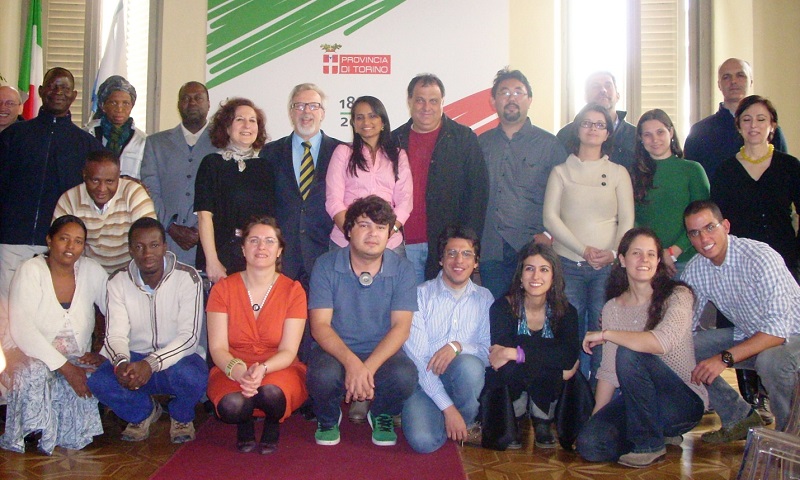
Water and sanitation are among the priorities of Agenda 2030; the Sustainable Development Goals (SDGs) cover issues such as health (58% of the global burden of disease is caused by unsafe water, sanitation and hygiene according to the World Health Organisation), the economy (75% of jobs are dependent on water according to the World Water Development Report 2016) and social stability (where water is missing or unsafe, conflicts and migration follow). The challenges ahead are not only ambitious, but urgent, and must be addressed smartly in order to optimize time and resources.
Hydroaid is a non-profit organisation transferring knowledge on sustainable water management to developing and emerging countries. In doing so it aims to contribute to SDG 6 (Ensure availability and sustainable management of water and sanitation for all) which impacts on poverty eradication, education, gender equality and climate change mitigation. One of the strategies we adopt is blended learning – a combination of distance-based-training, on-site activities and field support – that proved to be successful in multiple projects. On one hand it allows to expand the number of potential beneficiaries, with direct and indirect impacts on their living environment, while on the other hand enabling a richer pool of experiences and expertise that are shared and lead to the achievement of concrete steps forward in the consolidation of practices, policies and orientations for sustainability.
In a recent project, “Wastewater treatment: technical and managerial solutions for developing countries with severe environmental vulnerabilities”, a training and capacity development initiative realized with the financial assistance of ATO 3 (Water Authority of Turin) 86 participants from 23 countries were engaged in 16 weeks of e-learning on sanitation. With 1340 relevant contributions, this program set new records of participation and confirmed a great interest not only for the topics but for the opportunity of interacting with an international team of operators in the field of water and sanitation. They are the professionals-in-training and managers of tomorrow. All participants reported that they acquired substantial new knowledge and 80% said they will also have the opportunity of implementing their new knowledge to their work. With the goal of providing even stronger support to the improvement of local living conditions and the eradication of poverty, the top 10 qualified students will have access to the second phase of the project - a technical traineeship in Italy to reinforce their new knowledge and skills.
John’s Story
John N.G. (28) from Nairobi, Kenya, is one of the participants. After the course he stated :
“The engagement with the staff and my fellow trainees has been very intense and informative. The course drew many students from different countries with who we shared experiences and scenarios. I am grateful to have achieved a score of 91%. The course required dedication and hard work, not just studying for tests but also gathering knowledge to fill gaps in the management of solid and liquid waste, specifically in urban and rural settings.
Through this program I learnt about the design of waste disposal facilities, the three Rs of waste management, policies and international regulations governing waste management. What I found particularly interesting in the context of my country was the energy recovery option from solid and liquid waste. Solid waste production in Kenya is about 5,990 tons per day, most of which is produced in Nairobi (40%) and Mombasa (36%). The program has opened my mind to the potential we have for energy recovery and utilization from waste.
Among other challenges facing the sector is the lack of awareness and knowledge of the importance of a clean and healthy environment, and limited technical competencies. I also learnt that investment opportunities exist in recycling, composting and the adoption of emerging technologies in waste management, as well as the opportunity to implement the existing environmental regulations to achieve the SDGs and Kenya’s Vision 2030.
I thank the management, tutors and my fellow colleagues for a course well managed and taught, and the productive interactions on the platforms. Indeed, if we stand and work together, we have the capacity to make our environment clean and healthy for present and our future generations.”
John’s story is just one of over 1500 others we have had the privilege of hearing over the past 15 years. We strive to continue and learn from their feedback, a fundamental step for anyone involved in the training sector, to achieve sustainable development.
Lessons Learned
From this course we gathered experience and information to pursue training and capacity development in the sanitation sector as a key priority, especially in areas where this is underfunded. As for the beneficiaries, we encourage them to share and continue sharing their knowledge, and recommend stronger networking with an aim of establishing long-lasting and productive collaboration.
Learn more about Hydroaid - Water for Development Management Institute.
 Welcome to the United Nations
Welcome to the United Nations